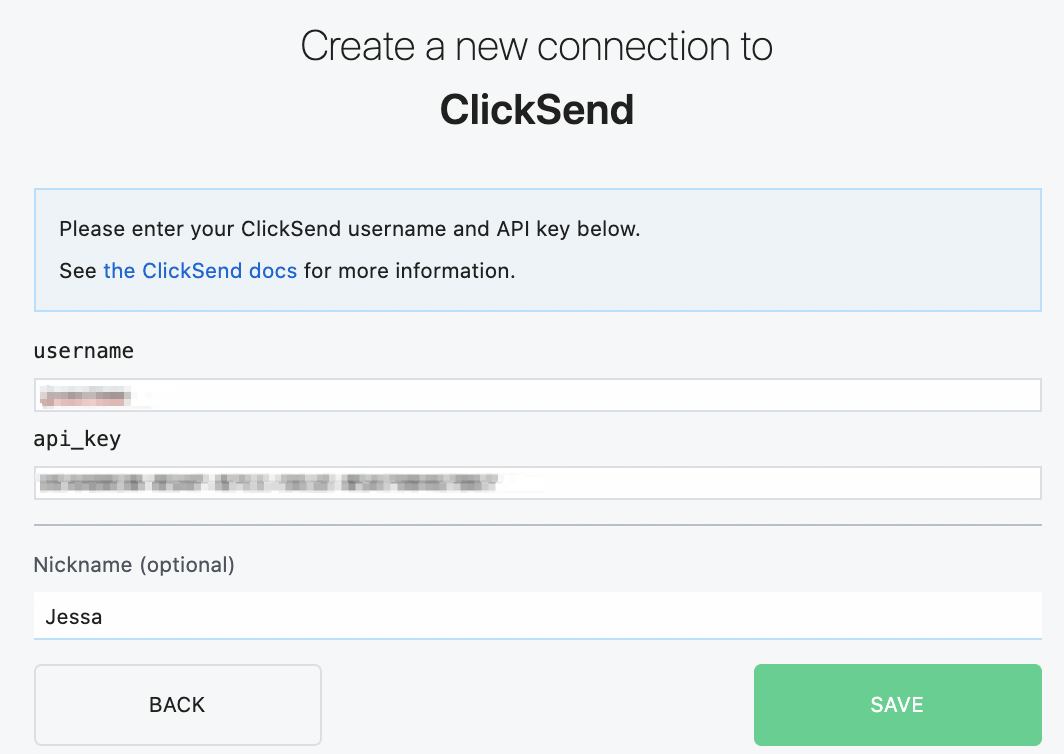What do you want to automate
with ClickSend SMS and Slack?
Prompt, edit and deploy AI agents that connect to ClickSend SMS, Slack and 2,800+ other apps in seconds.
Trusted by 1,000,000+ developers from startups to Fortune 500 companies
Popular Ways to Connect ClickSend SMS with Slack#
Popular ClickSend SMS and Slack Triggers#
Emit new event when a new message is posted to one or more channels
Emit new event for each new incoming SMS message received. See the documentation
Emit new event when a new voice message is received or sent. See the documentation
Emit new event when a message was posted in a direct message channel
Popular ClickSend SMS and Slack Actions#
Creates a new contact in a specific list. See the documentation
Send a message to a public or private channel. See the documentation
Sends a new MMS to one or multiple recipients. See the documentation
Send a message to a user, group, private channel or public channel. See the documentation
Sends a new SMS to one or several recipients. See the documentation
Overview of ClickSend SMS#
The ClickSend SMS API unlocks the potential to integrate robust messaging capabilities into your workflows. With Pipedream, you can not only send SMS messages programmatically but also automate notifications, streamline communication based on events, and much more. Whether you're confirming orders, alerting staff, or engaging with customers, ClickSend and Pipedream make these tasks seamless.
Connect ClickSend SMS#
import { axios } from "@pipedream/platform"
export default defineComponent({
props: {
clicksend: {
type: "app",
app: "clicksend",
}
},
async run({steps, $}) {
return await axios($, {
url: `https://rest.clicksend.com/v3/account`,
auth: {
username: `${this.clicksend.$auth.username}`,
password: `${this.clicksend.$auth.api_key}`,
},
})
},
})
Overview of Slack#
The Pipedream app for Slack enables you to build event-driven workflows that interact with the Slack API. Once you authorize the app's access to your workspace, you can use Pipedream workflows to perform common Slack actions or write your own code against the Slack API.
The Pipedream app for Slack is not a typical app. You don't interact with it directly as a bot, and it doesn't add custom functionality to your workspace out of the box. It makes it easier to automate anything you'd typically use the Slack API for, using Pipedream workflows.
- Automate posting updates to your team channels
- Create a bot to answer common questions
- Integrate with your existing tools and services
- And much more!
Connect Slack#
import { axios } from "@pipedream/platform"
export default defineComponent({
props: {
slack: {
type: "app",
app: "slack",
}
},
async run({steps, $}) {
return await axios($, {
url: `https://slack.com/api/users.profile.get`,
headers: {
Authorization: `Bearer ${this.slack.$auth.oauth_access_token}`,
},
})
},
})
Related Videos#


Community Posts#


